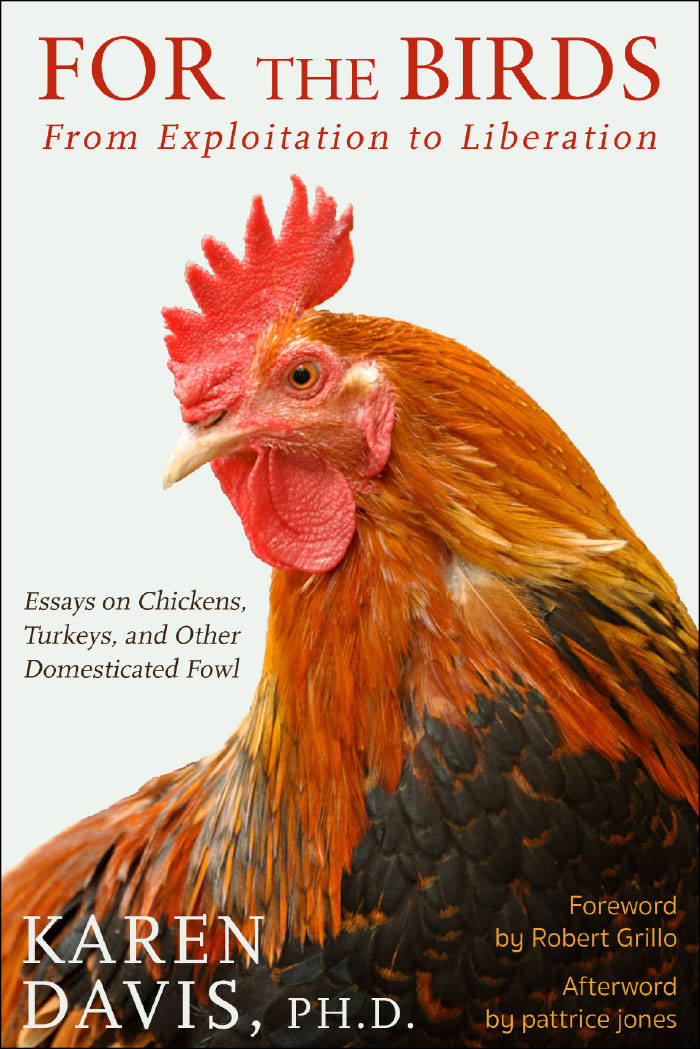For The Birds: An Urgently Necessary, Deeply Moving Work
By Philosopher John Sanbonmatsu, PhD
Karen Davis is one of the most important voices in the animal advocacy movement today, so it was with great interest that I recently read “For the Birds,” her powerful and deeply moving book. The fifteen essays in “For the Birds” span decades in her life as a researcher, activist, and founder and director of United Poultry Concerns, one of the nation’s premiere animal rights organizations.
The book begins with a moving account of Karen’s childhood growing up in an avid hunting town in Pennsylvania. Karen was an unusually sensitive child and young adult, painfully attuned to the suffering of others. (When she learned about the Holocaust for the first time, she recounts, the experience proved so psychologically shattering to her that she briefly had to drop out of school.) Eventually, after college, Karen applied her long commitment to human social justice to advocacy for farmed animals, founding the national nonprofit, United Poultry Concerns, and opening a sanctuary. She has since become one of the most effective and fearless advocates for animals anywhere in the world.
Subsequent chapters in “For the Birds” cover such diverse topics as the ontology and experiences of chickens in the poultry industry, animal cognition, debates in environmental ethics, analysis of news media coverage of animal issues, and much more. Every chapter offers frequently brilliant insights into the nature of speciesism as ideology and as brutal practice.
As indicated by the book’s title, “For the Birds” centers on the experiences of avians (chiefly chickens) in the poultry industry. Karen shows how chickens and other animals are mutilated not merely physically, but psychologically and even ontologically, as the meat and egg industries employ every possible means of force to shape the chicken’s very being to conform to the prime directives of efficiency and profit. Even readers familiar already with intensive animal agriculture will learn something new here about the unspeakable cruelty enacted daily against chickens, turkeys, and other sensitive beings languishing in the human gulag. Reading about such horrors, we cannot but share her indignation and outrage at the barbarism of humankind.
It takes a skilled writer, however, to be able to make us feel more than horror, and Karen Davis, who earned her doctorate in literature, approaches her material in an engaging way that never fails to hold our interest. When I put down “For the Birds,” I wanted to know more rather than less about the complex issues she had raised. The spare, cogent quality of her prose only heightens the pathos of her unsparing arguments, which burn with restrained anger and are framed by the author’s uncompromising moral vision. “For the Birds” is a call to moral arms, and there are few who could resist so eloquent and powerful a call.
Some of the most affecting passages in “For the Birds” are to be found in Karen’s personal observations of the chickens and turkeys in her sanctuary. She vividly conveys the intelligence and dignity of these beings, revealing them not as “types” but as individuals, each with a distinct personality, likes and dislikes, relationships, and emotional complexity. That the birds are also rescues who, in many cases, suffered severe physical and psychological trauma, only makes her stories of the birds’ resilience, affection, and trust that much more poignant.
“For the Birds” will appeal to anyone who cares about animals.
However, the book will hold special interest for readers who are themselves
involved in animal activism, and who stand to benefit from Karen’s
invaluable, hard-won reflections on movement tactics and strategy. In her
exemplary life, as in her new book, she demonstrates the importance of
remaining true to one’s ideals and principles--no matter how long the
odds. It takes courage, she shows, to hold a mirror up to society and
demand that society see itself as it truly is, rather than as it imagines
or wishes itself to be. Though it is hard to find such courage, and harder
to maintain it, Karen Davis shows us why that courage is so
necessary–“for the birds.” And for all the animals.
– John S. Sanbonmatsu
John Sanbonmatsu, PhD is Associate Professor of Philosophy in the Department of Humanities and Arts at Worcester Polytechnic Institute in Worcester, Massachusetts.
